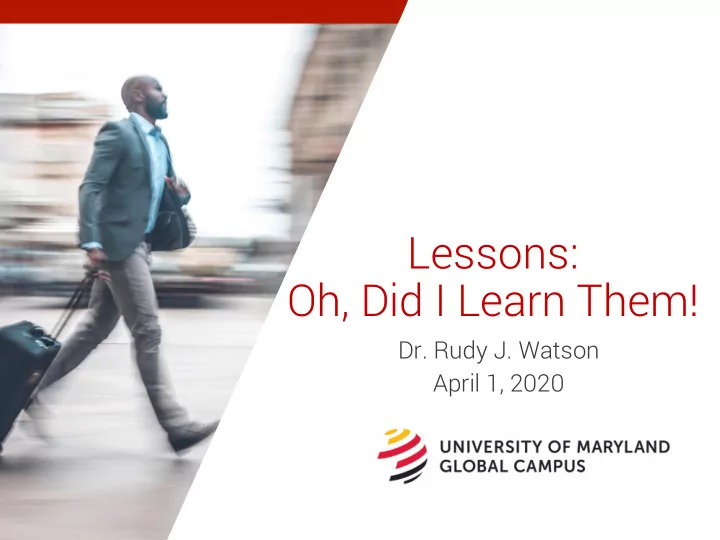

Lessons: Oh, Did I Learn Them! Dr. Rudy J. Watson April 1, 2020
Measures of Success Should one include factors outside of the project key performance indexes?
Measuring Project Success ❑ Scope ➢ This is the intended result of a project and what is required to bring it to completion. ❑ Schedule le ➢ Were you able to hit your milestones on time and did your project get delivered on time? ❑ Budget et ➢ Your ability to deliver your project within budget is usually considered one of the greatest indicators of success. ❑ Team am Sati tisf sfact ction ➢ This is more subjective in nature and is often overlooked when evaluating project success. ❑ Custo tomer mer Satisf sfact ction ion ➢ Get the feedback of your clients on whether their needs were met. ❑ Quality lity ➢ The point isn’t only to deliver the intended work but also to exceed expectations. What was the impact on your personal development? Eskander, Diana. 6 Ways of Measuring Project Success. October 10, 2018. retrieved on November 9, 2019 from: https://project-management.com/6-ways-of-measuring-project-success/ 3
Interpersonal Skills
Verbal Communication The problem with Skills communication is the illusion that it has been Words are powerful tools of accomplished. communication. George Bernard Shaw Indeed, word choice can easily influence the thoughts, attitudes, and behavior of the people listening to us.
Listening and Hearing: They Aren’t the Same Thing Hearing: Perceiving sounds Listening: Deliberate attention
See the Other Side Their values
It’s Not What You Say, It’s How You Say It Tone Emphasis Pace Volume
Bringing It All Together Sometimes, one creates a dynamic impression by saying something, and sometimes one creates as Be consistent Use emotions and significant an with your and facts impression by remaining silent. message Dalai Lama
Coaching
Delivering Constructive Criticism may not be Criticism agreeable, but it is necessary. It fulfills the same Constructive criticism can be a function as pain in the human helpful tool when used with the body. It calls attention to an intent of helping or improving a unhealthy state of things. situation in the workplace. However, Winston Churchill it can be one of the most challenging things not only to receive, but also to give. It can often involve various emotions and feelings, which can make matters delicate.
Create a Safe Atmosphere • Team members are more open to approaching you with problems or concerns. • Allows you to deliver news or criticism to individuals without frightening them. • People will feel more at ease hearing constructive criticism.
When Should Feedback We cannot build our Occur? own future without helping One aspect of delivering constructive others to criticism is in knowing the right time build theirs. and opportunity to deliver it. If it is Bill Clinton done too soon, it could make the team member doubt their abilities and affect their job performance. If delivered too late, then the team member may ignore it altogether and dismiss any help at all.
Gather Facts on the Issue Practice Your Tone Create an Action Plan It is Best to Be Face to Face Immediately After the Occurrence
Check the Ego at the Door Use the Feedback Sandwich Choose the Correct Words Empathize Check for Understanding Focus on the Future
Honest criticism is hard to take, particularly from a relative, a friend, an acquaintance, or a stranger. Franklin P. Jones
Emotional Intelligence
What is Emotional Experience is not what Intelligence? happens to you – it’s how you interpret what happens to you. Emotional Intelligence is a part of Aldous Huxley you that affects every aspect of your life. Understanding the root causes of your emotions and how to use them can help you to effectively identify who you are and how you interact with others.
Emotional Intelligence Whatever the mind can Benefits conceive and believe, the mind can A person with high emotional achieve. intelligence can manage his or Dr. Napoleon Hill her own impulses, communicate with others effectively, manage change well, solve problems, and build rapport in tense situations.
Skills in Emotional Any person capable of Intelligence angering you becomes your master; he can Developing successful Emotional anger you only Intelligence begins by understanding when you permit yourself your emotions and their meanings. to be disturbed With this understanding, you must by him. uncover productive ways to manage Epictetus your emotions, then use them to the benefit yourself and others.
Tools to Regulate Your The sign of intelligent Emotions people is their ability to control emotions by the The ability to keep your emotions application of reason. under control requires more than a Marya Mannes willing heart. Understanding a situation through the eyes of another and strengthening self-management and self-awareness skills are tools that can be used in your quest to regulate your emotions.
See the Other Side Ask other people Honest look at yourself Valuable tool
Use Emotions to Facilitate Thinking How you feel determines how you view the situation Choose to be in a good mood
Self Management and Self Awareness Balance between Understand who Be consistent and arrogance and you are accountable awareness
No one can make you feel Gain Control inferior without your consent. Eleanor Roosevelt Having control or the lack thereof could be the difference between building a successful career and no career at all.
Words from the Wise Plans are nothing; planning Dwight is everything. Eisenhower Yogi Berra In theory there is no difference between theory and practice. In practice there is.
Questions? Rudy J. Watson, Ph.D., PMP rudy.watson@umgc.edu 240-684-2519 27
Recommend
More recommend